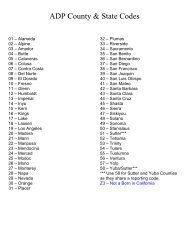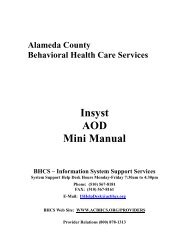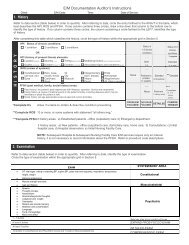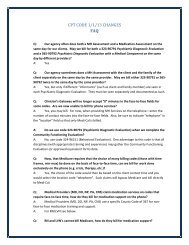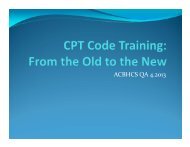Juvenile Competency Protocol - Alameda County Behavioral Health
Juvenile Competency Protocol - Alameda County Behavioral Health
Juvenile Competency Protocol - Alameda County Behavioral Health
Create successful ePaper yourself
Turn your PDF publications into a flip-book with our unique Google optimized e-Paper software.
SECTION ONE<br />
INTRODUCTION AND SCOPE<br />
Summary<br />
When a juvenile delinquency judge believes a minor may be incompetent to enter<br />
a plea/stipulation and withstand trial or be adjudicated (because the minor does not<br />
understand the court process or cannot effectively communicate with his/her attorney),<br />
the court must suspend the proceedings. The proceedings are suspended because it is<br />
unjust to subject a person to a court process the person is not competent to understand.<br />
The steps in most competency cases: first, a doubt is raised. Next, the court<br />
conducts an initial inquiry process. If the court finds there is “substantial evidence” of<br />
doubt regarding the minor being competent, the proceeding is suspended. The court<br />
orders the minor’s competency evaluated by a <strong>Competency</strong> Evaluator. Following the<br />
court-ordered competency evaluation, the court will seek a stipulation from the parties<br />
that the minor is either competent or incompetent. If there is no stipulation, there will be<br />
a trial to determine if the minor is competent. Following the potential stipulation or trial,<br />
the judge makes a finding regarding the minor’s competence or incompetence. If the<br />
minor is deemed competent, the underlying juvenile case is no longer suspended and may<br />
proceed. If the judge finds the minor incompetent, regular juvenile proceedings remain<br />
suspended. There will be periodic reviews to see if the minor has attained competency.<br />
If the minor attains competency, the underlying proceeding is no longer suspended and<br />
the case begins again, where it left off. If the minor does not attain competency, the<br />
underlying proceeding remains suspended for a period of time that is no longer than<br />
reasonably necessary to determine where there is a substantial probability that the minor<br />
will attain competency in the foreseeable future or the court no longer retains jurisdiction.<br />
W&I §709(c)<br />
Scope<br />
This <strong>Protocol</strong> of the <strong>Juvenile</strong> Court of <strong>Alameda</strong> <strong>County</strong>, provides an overview of<br />
procedures for determining a minor’s mental ability to participate in juvenile<br />
proceedings, the evaluation of a minor, the competency hearing process, the attempt to<br />
obtain/restore competency, judicial review, and the steps to take when the minor is either<br />
found to be competent or not competent. This <strong>Protocol</strong> shall not be used to determine a<br />
minor’s mental state at the time of the alleged offense(s) for which the minor is accused.<br />
Legal Overview<br />
In all cases, if the court, or minor’s attorney has a reason to doubt whether the<br />
minor is competent to enter a plea/stipulation or withstand trial, the issue should be raised<br />
at the earliest possible point in the regular juvenile proceeding. Once raised, the judge<br />
has an obligation to determine if the minor is possibly incompetent.<br />
Judge must exercise proper discretion and must make the initial decision whether<br />
to proceed toward a competency hearing or not, and, if there is a competency hearing,<br />
3 Superior Court, <strong>Alameda</strong> <strong>County</strong>, California<br />
<strong>Juvenile</strong> Court, <strong>Juvenile</strong> <strong>Competency</strong> <strong>Protocol</strong><br />
March 1, 2013



